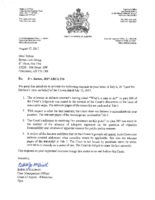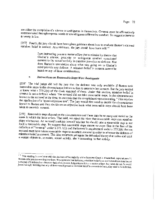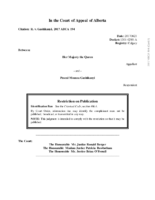 To Members of the Criminal Trial Lawyers Association:
To Members of the Criminal Trial Lawyers Association:
Update: Sept. 9, 2017
As some of you know, on June 30, 2017 the Court of Appeal released a 91 page judgment in R. v. Barton overturning a jury acquittal of Bradley Barton on a charge of first degree murder in the death of Cindy Gladue. I am in the process of drafting a leave to appeal argument to the Supreme Court of Canada which will be filed on or before September 29, 2017.
Separate and apart from legal arguments that will be raised before the Supreme Court concerning potential errors of law committed by the Court of Appeal are my concerns over comments made by the Court in its Reasons for Judgement regarding submissions I made during oral argument on September 6 and 7, 2016. I found those comments professionally disparaging and unfair to me. I referenced my complaints in a letter to Chief Justice Fraser on July 6, 2017, a copy of which was posted on the List Serve on July 10, 2017. That letter is attached here for your convenience.
After making inquiries of Crown counsel about my letter, and reviewing transcripts of the proceedings for itself, the Court of Appeal replied to me by way of letter dated August 17, 2017 through Case Management Officer Bobbi Jo McDevitt. It also released three small portions of the transcript to me. The letter and transcript portions are also attached here.
I make several observations about the Court’s reply.
With respect to my first complaint, that the Court was grossly unfair by placing my words, “What’s a man to do?” out of context, the Court of Appeal responded in its letter that it was merely discussing that question within the “reasonable steps” analysis and therefore did place my words in the proper context. Paragraph 260 of the judgment reads as follows:
“It also assumes that all women in Canada, single, married or in an intimate relationship, are walking around this country – whether in their home, on a date, at work, at a restaurant or wherever – in a state of continuous consent to sexual activity unless and until they say no. This is not the law. As for those who question, as defence counsel did here, “What’s a man to do?” the argument can be summed up in one word: ask.”
As you can see from the transcript at pages 99/33-101/7 and 176/2, however, I made the comment, “What’s a man to think?’ (later repeated back to me by the Chief Justice on the second day as, “What’s a man to do?”) after outlining in my submissions to the Court the numerous steps Mr. Barton took that lead him to believe Ms. Gladue was consenting to the sexual activity in question. This included the fact she had consensually engaged in the identical sexual activity with him the night before and had, after agreeing to a negotiated price, gone into the bathroom fully clothed, emerged fully naked, and sat on his bed and began to fellate him. They then engaged in further sexual activity, which included, on both nights, “fingering” and partial “fisting”.
As the transcript confirms, my rhetorical question was not made in reference to the general notion that men are somehow bewildered by the notion that women are not actually walking around this country in a state of continuous consent to sexual activity unless and until they say “no”. My comment was made on a very specific point, as the transcript shows, that given all these indicia of consent, what else could Mr. Barton have concluded? As clever as the Court’s turn of phrase might have been, it was a straw man device – neither accurate nor fair in the circumstances.
With respect to my second complaint, regarding the after the fact conduct, my admission during the hearing was that the trial judge misspoke when he stated , “You cannot infer that Mr. Barton is guilty of any offence as a result of his after the fact conduct, but it may be used to assess his claim that Cindy Gladue’s injury was an accident” and that he should have placed the word “alone” after the word “conduct.” I also agreed that the trial judge had not followed in one sentence the standard jury charge from Watt’s Manual of Criminal Jury Instructions I did not concede, however, these were errors in law for the reason they did not upset the correctness of the trial judge’s charge on the issue when the charge was read as a whole. I tried to make this clear on the record (See Transcript pages 179/29 to 180/6 and 181/4 to 181/41). However, the Court of Appeal misapprehended my submission as being an admission the trial judge had erred in law. Characterizing my submission in this way was prejudicial to Mr. Barton’s interests on an appeal to the Supreme Court of Canada. Had I not been able to obtain the transcript portions, the Crown could have used the Court of Appeal’s statement here to argue I had admitted an error of lawwhen in fact the opposite was true.
With respect to my third complaint, that the Court of Appeal criticized the fact they had received “no assistance from counsel” on whether consent should be vitiated for policy reasons based on the objective foreseeability of the risk of bodily harm during sexual activity, I specifically recall that I stressed to the Court it should follow the Ontario Court of Appeal’s position on this issue as established in the Zhao case, and looked forward to being vindicated by the transcript. I find it disappointing the Court chose to continue to make this criticism about counsel in its August 17th letter without releasing a transcript of that portion of the oral argument. Instead, it provided in its letter at paragraph 3 a conclusory statement that I had not provided “adequate” argument. A simple disclosure of the full transcript would have settled this issue, and I am left to question why the Court chose not to do so.
Finally, with respect to the Court of Appeal having ordered a new trial on first degree murder on the basis the defence failed to apply for, and obtain, permission from the trial court to delve into the deceased’s prior sexual history pursuant to s. 276 of the Criminal Code, the transcript of the appeal hearing confirms my recollection that the Crown conceded that if it were successful on any of the first three grounds, including the s. 276 issue, this would warrant a new trial on manslaughter only. (See Transcript pages 4/9-41). Nevertheless, the Court of Appeal stated in its letter, “The Court is not bound by positions taken by either counsel as to remedy on a point of law. The Court is obliged to state the law correctly.” Although this is generally correct, an appeal court should only do so when the issue is raised by the parties. And, it does not answer my argument that this created procedural unfairness to Mr. Barton because I was not afforded an opportunity to address this very “point of law” which the Court of Appeal – ignoring the concession of the Crown – raised and ruled on only its Reasons for Judgement. This had the effect of completely ambushing Mr. Barton.
This is also yet another example of the Court of Appeal failing to provide adequate notice of points of law it wishes to raise and address with counsel in accordance with the dictates of Mian. In fact, it is worse than the Court of Appeal’s conduct in Mian because at least counsel in Mian was put on notice before the hearing that the Court of Appeal wished to receive written argument on an additional ground raised by the Court which favoured the Crown. In Barton, the Court of Appeal never raised at any point that it was looking to order a new trial on first degree murder should the Crown succeed on the s. 276 issue.
In its 91 page landmark decision the Court spared few in its scathing rebuke of Mr. Barton’s acquittal of all charges by a jury. Most disheartening was the Court’s treatment of Mr. Justice Graesser, a judge who is universally held in high regard for his intelligence, thoughtfulness and fairness. Justice Graesser ran a fair and impartial trial under complicated circumstances. Overlooked in the Court of Appeal’s Reasons is that he provided a charge to the jury that, save for his comments on motive, was agreed to – word for word – by the Crown at trial. Indeed, three of the four grounds of appeal raised by the Crown, and all additional grounds for overturning the acquittal raised by the Court of Appeal, ran contrary to the positions taken by the Crown at trial. Also, Justice Graesser did not have, as the Court of Appeal did, the luxury of more than nine months to weigh and consider to a nicety his charge. He had a jury waiting.
This is by no means a small matter. The Crown has benefited greatly from this exercise. Not only has the Court of Appeal’s decision provided the Crown a “do-over”, but also a blue print on what had better be done the next time. It also sends a dangerous message that the Crown can reverse its position between trial and appeal with impunity.
Mr. Justice Graesser’s words, and why he said them, are there for all to see because there is a publicly available transcript. It is therefore not only fair, but crucial to maintaining a free and democratic commitment to the administration of justice, that those who sit in judgement of him be held to the same scrutiny. So, the Court’s decision here to not provide a transcript to settle a legitimate concern raised by counsel before the Court is particularly ironic.
I hope these observations may convince some skeptics of the importance of an automatic right to transcripts for hearings before this very powerful Court. Counsel should not have to behave as supplicants asking for something that is presumptively beyond their status. A hallmark of justice in a free and democratic society is that all important matters of adjudication by courts and tribunals be held in an open and transparent manner. To that I would add – at least in criminal cases where the liberty interest is engaged – a resort to a record. It should not require counsel and observers in the gallery to have photographic memories of what was said in a court of law in order to seek relief.
As things presently stand, counsel appearing before the Court of Appeal have no automatic recourse to prove when and under what circumstances the Court of Appeal may have misapprehended or mischaracterized their submissions during oral hearings. Aside from impugning counsel’s professional integrity, this can prejudice a litigant’s ability to provide a factual foundation for a ground of appeal to the Supreme Court of Canada. It may also impact on whether decisions of the Court of Appeal are truly binding on lower courts as stare decisis because the issues were properly raised and ruled on by the Court, or merely that of obiter. Finally, the Court of Appeal should not be allowed to be selective as to what it chooses to transcribe and make available to the public about proceedings before it. That has the potential for abuse.
Given the above, I think it is time – at long last – that the Court of Appeal change its policy and make transcripts of its proceedings available to the public. This is part and parcel of the need for greater transparency in how Alberta’s highest court conducts its business (see Berger, JA.’s comments at paras. 68 to 75 in Gasinkanya 2017 ABCA 194). I hope you all agree, and that you make your own requests if you feel it is warranted. In addition, I intend to submit to the Supreme Court of Canada that access to appeal transcripts should be more easily resorted to in keeping with the spirit of Mian. Barring that, perhaps the CTLA should lobby the Provincial Government to amend the Court of Appeal Act to mandate automatic public access to recordings and transcriptions of hearings before the Court Appeal.
Of course, these are only my suggestions. You may have better ones.
Yours truly,
Dino Bottos


